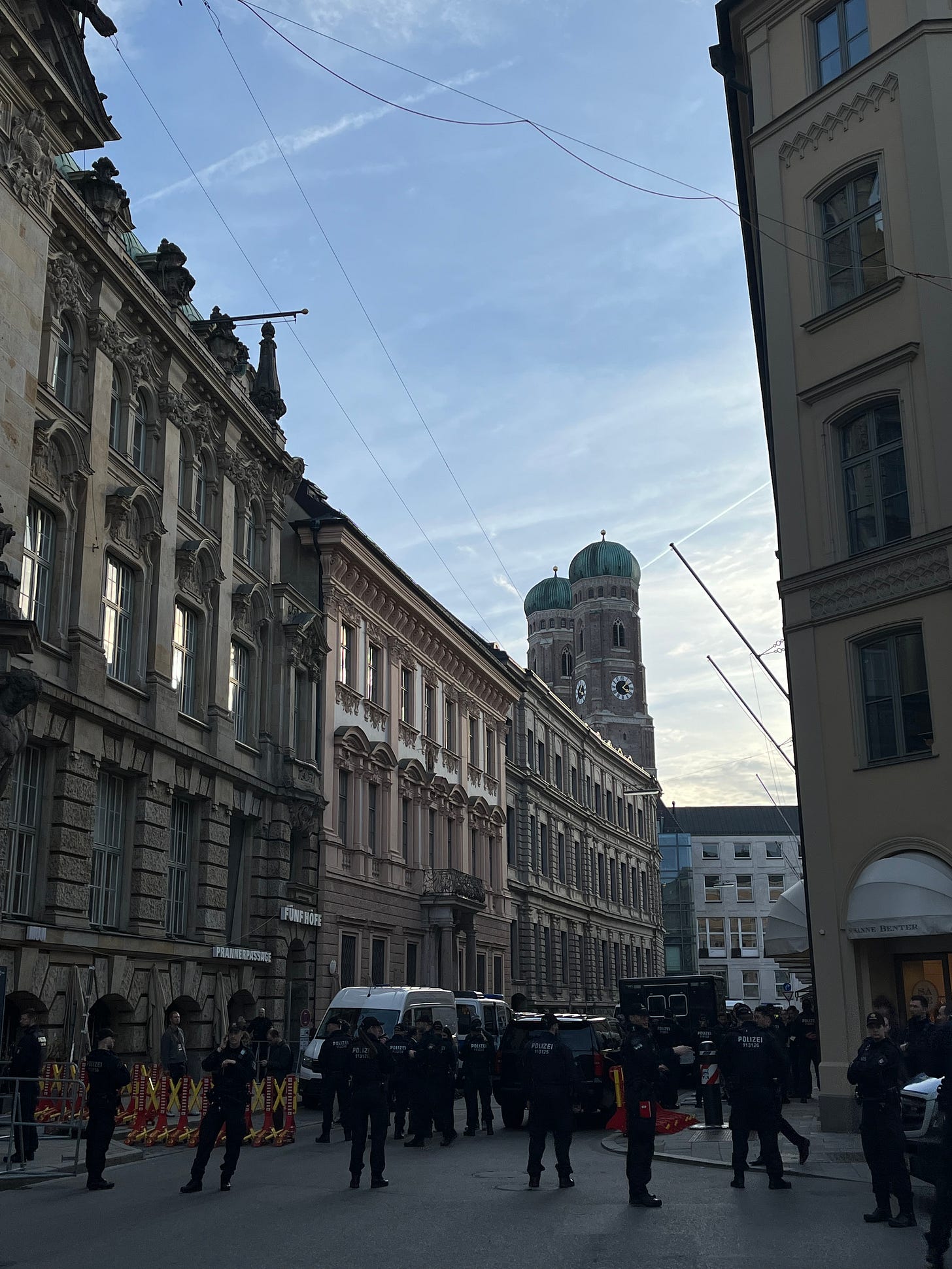Like reading The ‘Schland for free?
When I think about the Munich Security Conference, I often think about Winnie-the-Pooh.
The conference, whose 60th birthday overshadowed my 38th this year, sees itself about as wonderfully as Pooh’s bouncy trouncy flouncy pouncy friend — and makes sure you know that. Every year, the world’s security and foreign affairs elite make the pilgrimage to this Mecca on the Isar, prostrating themselves before a Kaaba called Hotel Bayerischer Hof, as proscribed by the sacred texts written in the sooty ink of Europe’s ashes that settled on the Stunde Null to emerge from modern history’s Big Bang.
Fitting the entire international rules-based order into such a compact venue is a big ask, but you don’t mess with tradition. You also don’t mess with the international rules-based order. That makes MSC a bit of a fait accompli. As “the world’s leading forum for debating international security policy,” it’s a portrait of status quo set up to ask itself how to improve itself. By definition, that approaches tautology territory. Criticism is curated, attendance selective, and access restricted. It is openness with an asterisk — much like the system it represents.
Of course, the event is an opportune sleight of hand — less about what’s happening on the stages and in the rooms than at dinners and behind closed doors where leaders, policymakers, and intelligence officers trade whispers. MSC can be a convenient backchannel to tell the guy you can tolerate to tell the guy you don’t talk to officially to maybe not go through with that nuclear test he’s said to be planning.
For the bulk of the journalists looked upon to spread the good word, watching the livestream in pajamas at home can offer about as much as the off-site media tent to which they are largely confined. Best to avoid the venue altogether, where layers of status and a labyrinth of chokepoints turn attending an agenda item into a dash to catch a long-haul flight; the wiser move is making your meetings over a beer beyond the barriers.
The choreography of control — from the eager poli-sci interns in ill-fitting suits misdirecting pedestrian traffic, to the semi-inconspicuous guns concealed in more fitting attire, to Kamala Harris’ beefy Secret Service detail chilling in tactical gear in armored U.S. GOVERNMENT Suburbans on the street outside — puts the S in MSC.
Even VIPs and invited guests can be heard to complain occasionally about the ordered disorder. And the spotty wifi. At least this year, organizers commandeered a neighboring hotel to serve as a kind of rearguard mudroom, which served as the cesspooling area for those unworthy of traversing the holy grounds unsupervised. An unwieldy bridge connected the two hotels, like an airlock between privileged galactic voyagers and the unforgiving universe beyond. The extra space was a wise and necessary addition except, much like in the cosmos, it was also a cell dead zone.
In short, the MSC was and is an awkward affair. Given its mission to “build trust and to contribute to the peaceful resolution of conflicts” a look around the world these days leads one to reasonably ask, "how’s that going?” When I posed such a question to MSC Chairman Christoph Heusgen, a former top advisor to Chancellor Angela Merkel and ambassador to the United Nations, ahead of last year’s conference, he accused me of being a Russian troll.
The 2024 iteration built on the discrepancies of previous episodes. But it gets an A for effort. At least some part of it heard UN Secretary-General António Guterres say that “today’s global order is not working for everyone.”
“In fact, I would go further and say: It’s not working for anyone.”
In fact, António, not a fact. The global order is working fine for some. The weapons industry, for example, though the rest of us appreciate your effort in principled exaggeration. Over time, the rule-making West has made more space at its table for the rule-taking Rest, but the seating arrangement remains abundantly clear. Please join us, but we will tell you where to sit and no you can’t throw food even if we do.
A long history of double standards accompanied MSC 2023; for MSC 2024, the geopolitical gaslighting wasn’t just in the air, but on the nose. Any gains in humility made in the intervening time, as the rule-makers have tried to seduce the rule-takers into a polyamorous relationship with Ukraine, have been all but wiped out in Gaza. Here you have one country, which gets to belong to the “Global North,” waging one of the most destructive wars in recent memory on a civilian population belonging to the “Global South.”
At least Chancellor Olaf Scholz asked Bibi to promise to be good, and he said he will — so, really, what more do you want? Obviously the problem isn’t that, but Brazil’s President Luiz da Silva for comparing “Israel's war against the Palestinian terrorist organization Hamas to the Holocaust.” We can’t have that; Holocaust comparisons are only allowed in one direction, in the service of conflating Jews and Israel so we can then wonder why antisemitism is so bad these days.
Maybe it’s still not too late to get Bolsonaro back, who was much simpler to despise. A guy like da Silva gunks up the goody-baddie machine.
A plainer example of the imbalances in the global relationship is hard to come up with, which is why more countries these days are saying they prefer an open one. The world may be neither unipolar nor multipolar, as think tankers bicker back and forth about, but bipolar and non-monogamous. Watch out for sudden mood swings and a rotating cast of bedmates.
With the war in Ukraine going sideways and the one in Gaza plumbing heretofore rarely visited depths of hell, no one in Munich was in much of a state to tackle either. Not publicly, at least. You don’t need to buy a ticket to Tucker Carlson’s community theater production of “Journalism: The Musical” to acknowledge that just repeating Hasta la victoria siempre is not a strategy for supporting Ukraine. Chatting with a retired career American diplomat, I found myself chasing my tail when asking how to defeat Russia in Ukraine without Putin feeling he is at personal existential risk.
“But it isn’t existential!”
Yes, you know that and I know that and everyone on this side of the Fulda Gap knows that, but the one guy who’s convinced himself of exactly that is the guy sitting on several thousand nuclear weapons and evidently doesn’t care how many Russians die holding the line in Donbas. Given the ill-defined insistence on “victory,” it actually isn’t that clear if defeating Russia in Ukraine is different from defeating Russia is different from defeating Putin. The messaging gets even murkier when Ukrainian President Volodymyr Zelenskyy takes to the MSC stage and pulls an Ari Fleischer. (Unlike Ari, though, he’s actually been attacked and has every right to be livid.)
Russians don’t attend MSC anymore — much like the Iranians, North Koreans and, small doses aside, the Chinese — so we don’t really know where they stand. Apparently talking to your adversaries is tantamount to surrender. That’s for suckers like Ronald Reagan, whose Republican Party today is making the world order it helped build very nervous.
From Munich to Brussels to Madrid — and even Washington and Berlin — Israel looks increasingly isolated. But it might not matter, as the European Union’s de facto foreign minister pointed out ahead of the conference. Both Israel and much of international law arose, in tandem, out of the systematic destruction wrought by the ethnonational fantasy of totalitarian purity. To formally accuse the former of violating the latter in its inverted attempt to do the same would explode philosophical, historical, and very real strategic assumptions that the world order is predicated on.
Hence the rhetorical framing remaining firmly in place despite the considerable geopolitical shift. At MSC, as in other respectable circles, there is nothing controversial about labeling Russian aggression “genocide.” There were art exhibits installed to that effect. I struggle to imagine such liberties being allowed in the parallel case, even as Heusgen himself wants to call “a spade a spade.”
Still, Israeli hostage activists got a whole event to express their trauma in a way no voice for nearly 30,000 dead Palestinians ever could. Panels on the future of the Middle East were held largely without any Palestinian represented, while Israel’s president got an entire stage to himself to discuss the topic. Off-site, Hillary Clinton and the State Department’s Antisemitism Ambassador spent 70 minutes talking about how bad antisemitism has gotten ever since history started on Oct. 7. There was no Q&A, but they wanted to assure you that criticizing Israel is not antisemitic. Just follow the rules they deem appropriate for governing criticism — after all, manufactured dissent is the embodiment of liberal ideas.
Authorities in Berlin I guess have not received this message, however, as Jews and others are still getting beaten, arrested, and professionally assassinated for saying uncomfortable things. This is the freedom that venues like MSC insist we must protect from malevolent state actors who wish to take it all away — when they’re not busy arresting (in some cases, killing) contrarians of their own. As a whole society we aren’t there yet, but for some people and groups it can be increasingly hard to tell the difference.
MSC was all about making military might matter again. Europe may well get there one day, but it’s unclear what will be left to defend when it does. Ultimately, we may beat an external foe only to have created one from within.






